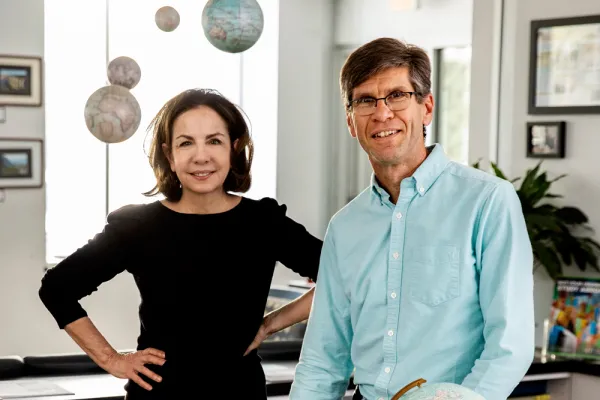‘A World of Possibilities’: Smith’s Interdisciplinary Approach
Research & Inquiry

Published June 11, 2019
Francesco Maria Del Re, a marine biologist from the University of Florence in Italy, has spent the academic year working with faculty from Smith’s biological and environmental sciences programs to study water pollution and the disposal of plastics.
Similarly, Aurora Pinto, a biomedical researcher from the University of Geneva in Switzerland, took advantage of labs on campus to study the way proteins work in the human body.
Both are graduate students at their universities and both spent the 2018–19 year at Smith in the newly revamped Diploma in Interdisciplinary Studies and Global Studies program (formerly known as the American Studies Diploma Program).
In May, they received a diploma, which acknowledges their time here, and joined hundreds of diploma holders who, since 1962, have come to Smith from universities around the world in order to study at an American liberal arts college. Unlike previous diploma graduates, Del Re and Pinto came to Smith from STEM fields. Until this year, the program only accepted humanities students, said Lane Hall-Witt, its director. “Now they’re also coming from the natural sciences and engineering and technology,” he said.
The 57-year-old program was renamed in 2018 in response to global changes in the academy. “Many universities have done away with American studies and replaced it with global studies or transnational studies,” said Rosetta Marantz Cohen, director of the Lewis Global Studies Center, the program’s new home.
Cohen said a large percentage of each diploma class has been part of reciprocal arrangements with universities in Paris, Florence, Hamburg and Geneva. Over the years, students have come from more than 40 countries, including Spain, Japan, Belgium, China, Nepal, the Netherlands, Russia and the United Kingdom. They have been advanced undergraduates or master’s students, many researching aspects of American culture, including the influence of Smith alumnae Betty Goldstein Friedan ’42, Nancy Davis Reagan ’43, Sylvia Plath ’55 and Gloria Steinem ’56. For most, tuition and room and board are covered.
Their time at Smith offers the diploma students an opportunity to break out of a narrowly prescribed program of study, Cohen said. “For many it’s the first time they’ve experienced a liberal arts education,” she said. “They come to appreciate its pleasures.”
Andrea Clausen, a 2011 diploma graduate, can vouch for that. “When I applied to Smith, I majored in media and communication studies with a minor in American literature at the University of Hamburg,” she said in an email. “One thing that really appealed to me about Smith was the opportunity to experience a liberal arts education and break out of the confines of the German course catalog.” Clausen works in Dublin as a strategy and sales manager for Google.
A 2013–14 attendee, Gaia Cozzi, a marketing specialist at a hotel in her hometown of Florence, Italy, said, “From day one, it was clear to me that Smith would be a world of possibilities I had never experienced before in my academic life.”
The American Studies Diploma Program began in 1962 under the leadership of the late Americanist Daniel Aaron. It had four students, and has gradually increased to about 10 students each year. Graduates have gone on to careers in diplomacy, government, law, the arts, academia, education, journalism and business.
In Smith’s Foreign Legion, a commemorative book about the program, longtime director Peter Rose, the Sophia Smith Professor Emeritus of Sociology and Anthropology, wrote about the program’s roots during the Cold War, a time of international tension: “Dan and several other members of the faculty began discussing the idea that Smith, a pioneer in so many aspects of international outreach, might offer a bridging opportunity to budding foreign scholars to learn the ways of American higher education.”
In the same volume, Enoch K. Wambua, a senator in Nairobi, Kenya, and a former newspaper managing editor, wrote that when he came to Smith in 2008 from Kenya’s Moi University, he was scared and excited by seeing snow, which he called “a natural wonder.”
“As for my academic life, Smith really nurtured me into a critical and logical thinker,” he wrote.
Wambua came back to campus in spring 2018 to thank the administrators. “So many students end up with a tremendous loyalty to Smith,” Cohen said.
Summer 2019 Smith Alumnae Quarterly
Rosetta Marantz Cohen and Lane Hall-Witt will direct the revamped Interdisciplinary Studies Diploma Program. Photo: Jessica Scranton